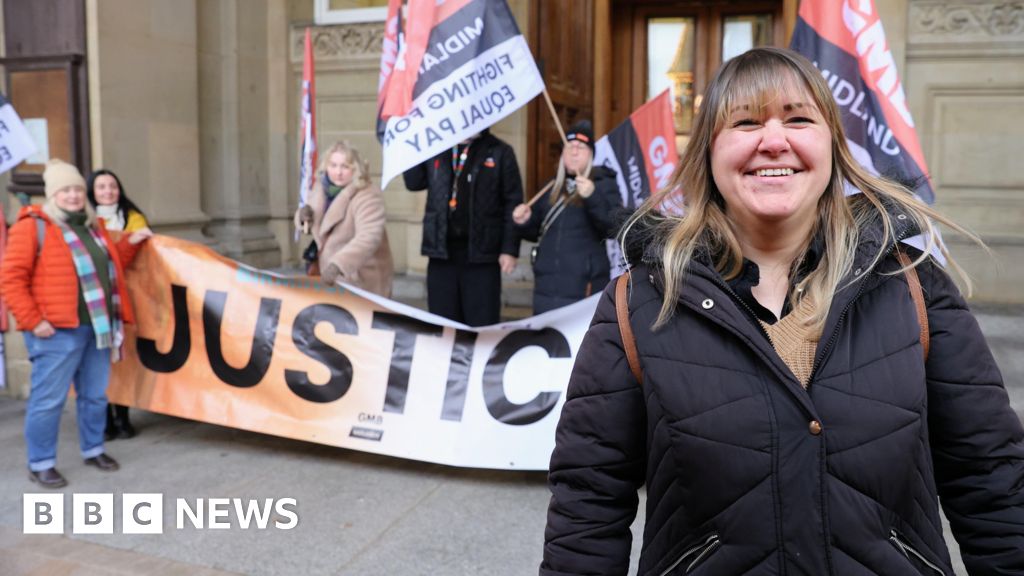
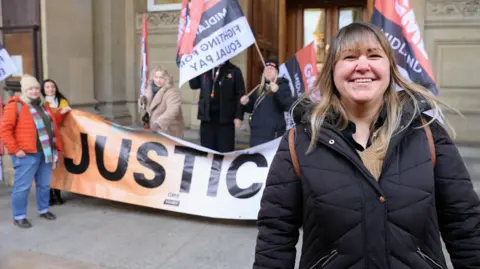 GMB Union
GMB UnionThousands of women are set to have their equal pay claims settled with a council after several years.
The agreement between Birmingham City Council, Unison and the GMB union will see 6,000 staff with the authority receive settlement payouts.
The equal pay issue was one of the key factors in the authority declaring effective bankruptcy last year when it said it was facing a bill of £760m to settle the claims.
Teaching assistant Pamela Whatley, from Acocks Green, said she was celebrating and felt “over the moon” to have “a bit more peace of mind” after fighting for four years.
The details of the agreement are confidential and the council’s cabinet will be asked to formally approve it on 17 December.
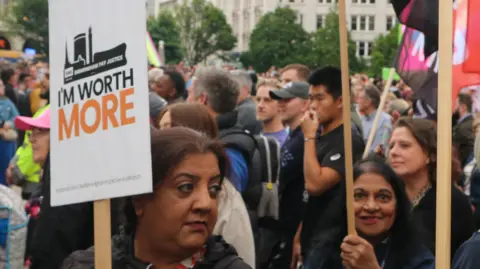
The dispute relates to claims staff in female-dominated roles, such as teaching assistants, have historically been underpaid in relation to those in male-dominated positions.
The campaign for the 6,000 women was launched four years ago, the GMB union said, and talks restarted in November.
Posting on X, the union said the women had “made history” and the claim was “a significant step towards pay justice”.
“This result would not have happened without their dedicated and tireless leadership of a campaign which was overcome huge odds,” Rhea Wolfson, from the GMB, added.
The settlement was a “good day for low-paid women” at the council, Clare Campbell, from Unison, said.
“They will at last get the pay justice they deserve,” she added.
“This will hopefully be the much-needed turning point for staff, services and local communities across the city.”
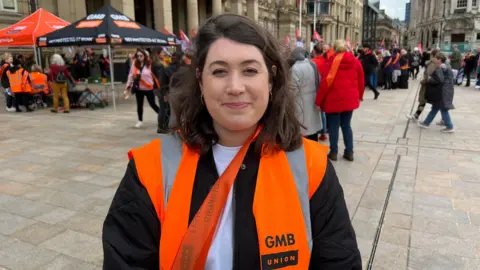
“It’s unfortunate we haven’t got our settlements in time for Christmas,” Ms Whatley said, adding she expected further details in the new year.
The GMB union rep was one of many workers gathering in front of Birmingham’s Council House in Victoria Square on Tuesday to celebrate the settlement.
She was also one of hundreds of school support staff to walk out in May in protest over the equal pay issues, and said she hoped her settlement would mean she could reduce her hours at a second job as a waitress.
“We’ve had to come out of work, the kids have missed education because of it,” she said.
“Hopefully [the settlement] will send a message to the next generation of children that I work with that women need to be able to stand up for their rights.
“I feel that it’s really unfair that we’ve had to do this for so long.”
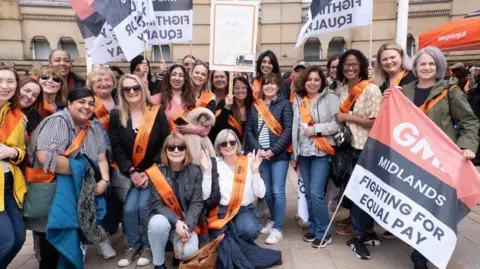 GMB Union
GMB UnionBirmingham City Council has paid out almost £1.1bn in equal pay claims since a landmark case was brought against the authority in 2012.
The authority said in 2023 the bill had spiralled to £760m.
However earlier this year, Max Caller, the lead commissioner appointed by the government to oversee the financial recovery of the council, said the bill to settle could be below that.
Sally Maybury, a former admin assistant at the council, was one of 174 people who won the ruling at the Supreme Court more than a decade ago.
The court found hundreds of mostly female employees working in roles such as teaching assistants, cleaners and catering staff missed out on bonuses which were given to staff in traditionally male-dominated roles such as refuse collectors and street cleaners.
She previously told the BBC: “I felt undervalued and treated as if I was worthless.
“It was very difficult, I was earning about £18,000, but as soon as I hit £22,000, there were no more incremental pay rises so my salary was kept quite low.
“I remember one year, my tax credits went up, even though my salary didn’t – that’s just crazy.”
Councillor John Cotton, leader of the city council, said the agreement marked the end of “an intense period of dialogue” between the authority and its unions.
“It is an important step on the council’s improvement journey,” he added.
Analysis
By Simon Gilbert, BBC Political Reporter, Birmingham
Today’s news draws a line under what is, arguably, the defining issue of Birmingham’s financial struggles.
It will come as a huge relief to bosses at an effectively bankrupt local authority already dealing with making £300m of cuts over two years.
What will offer even greater comfort is the level of the settlement.
Up to £760m was thought to be the worst case scenario but we understand the final figure to be hundreds of millions lower – somewhere about £300m-£400m.
The obvious question now is will this reduce the level of cuts needed in the city?
The answer is probably not.
The cuts already in the pipeline are more to do with overspending in other areas.
What could change is the level of assets sold off by the council.
These were being sold to balance a £1bn government loan to offset, principally, the equal pay liability.




